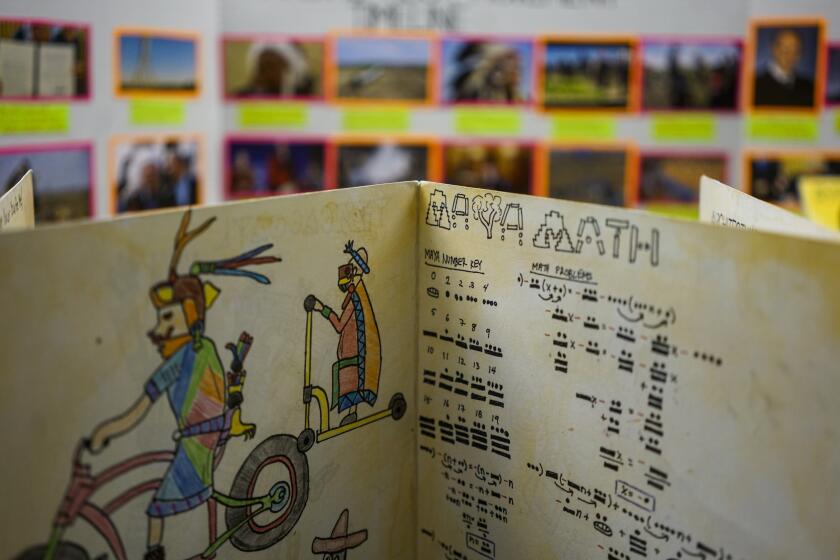Column: Require ethnic studies for California students. But first, rewrite the curriculum

There’s a legislative move to require all high school students to take an ethnic studies course or they can’t graduate. And that raises three serious questions:
— Should ethnic studies be forced on every California student or remain an elective as it has been in hundreds of public schools?
— If it’s to be required — ranked up there with English, algebra and U.S. history — what current course requirement should be waived to make room? There are only so many class periods in a school day.
— Should ethnic studies continue to be a separate course, or folded into regular history classes?
There’s also a more prominent question that has aroused heated controversy: What should Sacramento do with a recently created draft ethnic studies curriculum meant to help schools shape their courses?
That’s an easy answer: Tear the thing apart and substantially rewrite it. That’s the least that should be done and will be, officials have announced. Even better, it should be trashed and an entirely new, less contentious and more dispassionate curriculum written that’s simpler to comprehend.
California lawmakers are poised to make ethnic studies a graduation requirement in high schools and at Cal State universities.
You’ve probably read about this. A committee of academics wrote the so-called model curriculum after it was ordered up by 2016 legislation. The project was overseen by the State Board of Education and state Superintendent of Public Instruction Tony Thurmond. You’ve got to wonder what the overseers were thinking.
The draft curriculum doesn’t meet the project’s original goals of being “accurate, free of bias, appropriate for all learners in our diverse state and aligned with Gov. [Gavin] Newsom’s vision of a California for all,” state Board of Education President Linda Darling-Hammond said in a statement after the proposal kicked up controversy.
One of the harshest critics was the Legislature’s Jewish caucus. In a letter to the state education department’s Instructional Quality Commission, which managed the project, the caucus called the proposed curriculum “inaccurate and misleading in several critical respects” and contended it was “drafted in a manner that reflects an anti-Jewish bias.”
The draft discusses Islamophobia, the caucus noted, but “omits any meaningful discussion of antisemitism.”
Other organizations representing Armenians, Greeks, Hindus and Koreans also complained, protesting that they weren’t included in the curriculum.
Then there was the eye-rolling glossary with such unconventional “words” as “cisheteropatriarchy,” “hxrstory,” and “xdisciplinary.” You’d think most high schoolers have enough trouble mastering normal English without being confounded with this arrogant lingo.
An ethnic studies requirement for all high school students in California is on hold.
“I was taken back by the jargon,” says Assemblyman Jose Medina (D-Riverside), whose bill would make ethnic studies a required subject. “I’m a high school teacher. I wouldn’t find that vocabulary helpful to my students in clarifying things.”
There’s also a troubling definition of capitalism that includes this observation: “Research has shown that native people and people of color are disproportionately exploited within the system.”
But it should also be noted that poor people have always been exploited, whether they’re of color or white. Think “Okie” migrant farmworkers during the Great Depression.
Maybe those hardships — white people exploiting white people — should be studied, along with the racist, horrific ways California treated Asian immigrants for nearly a century, and people of color were legally discriminated against in housing until the late 1960s.
The highly opinionated draft curriculum seemed more provocative than informative. And that’s the last thing we need in this era of volatile polarization, much of it stemming from resistance to foreign immigration, illegal and legal.
A broad coalition of educators and student groups is defending California’s draft ethnic studies curriculum.
“As a teacher,” Medina says, “I want to be able to allow my students to make up their own minds on issues. We provide information and let students draw conclusions. I don’t want to tell students how to think. I want them to think for themselves.”
Medina, 66, whose parents migrated to California from Panama, taught ethnic studies, Chicano studies and history. He also sat on the Riverside Community College board. He currently is chairman of the Assembly Higher Education Committee.
Medina’s bill that would require every student to take ethnic studies easily passed the Assembly 63-8 in May. But he has shelved it until next year after the model curriculum is rewritten.
Should ethnic studies be required?
“If we can get this right, then yes,” says Sen. Ben Allen (D-Santa Monica), chairman of the Jewish caucus and a former member of the Santa Monica-Malibu school board.
It’s as important for white kids to take as students of color, he says. It could help all teens better understand one another and ease dangerous tensions.
Also, when students of color learn more about their ethnicities, it makes them feel better about themselves and school, Allen and Medina say.
OK, that makes sense.
But what other course should be taken off the required list to make room?
None, Medina says. He notes there’s no social studies course being taught in ninth grade. Perhaps ethnic studies could fit in there.
California’s controversial ethnic studies draft curriculum needs revisions, state board of education leaders say
Sure, but that would mean one less elective. There goes debate, music — or journalism.
Why couldn’t ethnic studies just be folded into upgraded history courses?
“I would not mind it,” Medina says. “But the sad reality is that in the last 50 years, it hasn’t happened. And I don’t have too much hope it will. Traditionally, our education has been Eurocentric.
“Therefore it’s necessary that we require ethnic studies.”
Fine. Require it in the ninth grade.
But first rewrite the curriculum in common English. Make it unifying, not divisive. Lay off the biases and pour on the facts. Simply and calmly.
More to Read
Start your day right
Sign up for Essential California for news, features and recommendations from the L.A. Times and beyond in your inbox six days a week.
You may occasionally receive promotional content from the Los Angeles Times.










